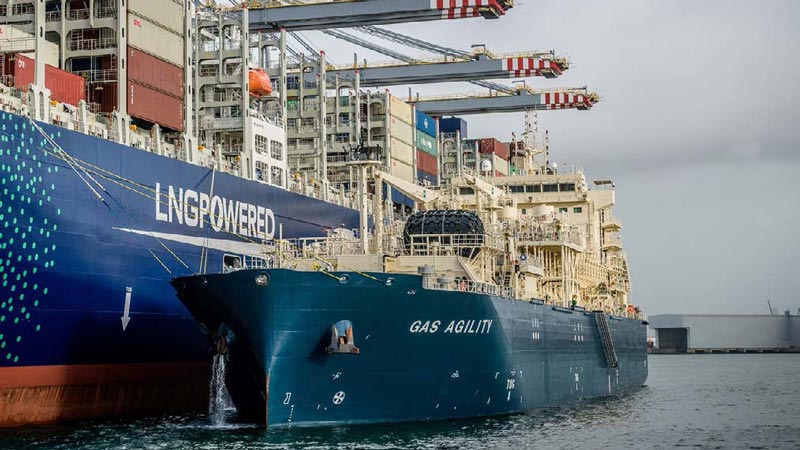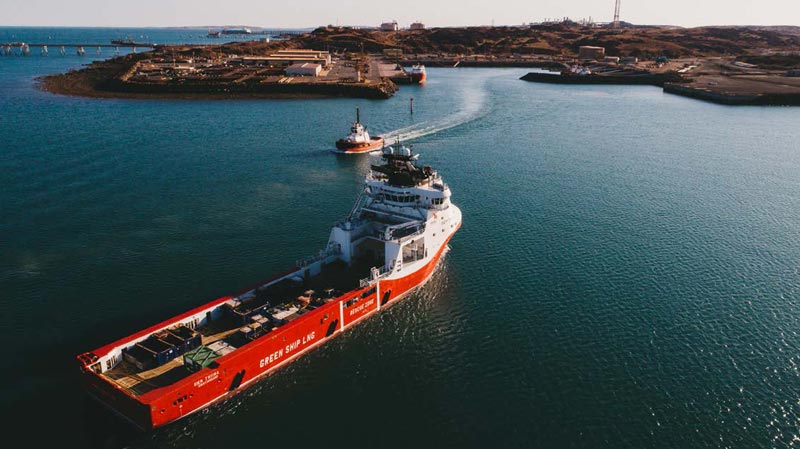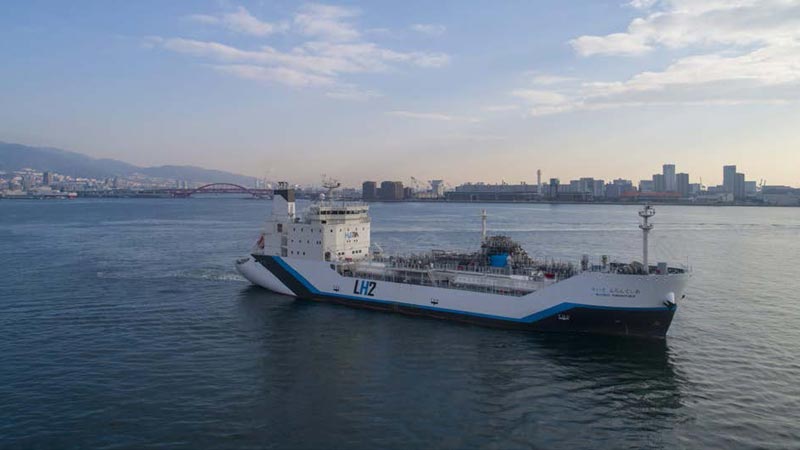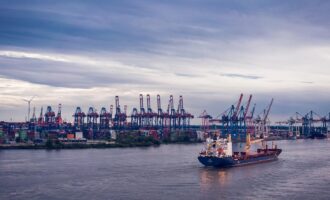
Call to action for zero-emission fuels in shipping sector
Maritime shipping is the backbone of world trade with around 90% of goods transported by sea. This difficult to decarbonise sector contributes over one billion tonnes of greenhouse gases (GHG) to the atmosphere, according to the International Maritime Organization (IMO), and is responsible for approximately 3% of global emissions.

IMO has adopted mandatory measures to cut emissions and fight climate change. Since January 1, 2020, new limits on the sulphur content in fuel oil have been in force, and IMO’s initial GHG strategy is targeting a reduction in the carbon intensity of international shipping by at least 40% by 2030. The strategy also stipulates that total annual GHG emissions from international shipping should be reduced by at least 50% by 2050, compared to 2008.
The private sector has been taking steps to develop cleaner marine fuel solutions to assist with the decarbonisation of global supply chains including research and development, pilot initiatives, building carbon-neutral vessels and investing in net-zero emission fuels. However, a growing number of organisations have sent a clear message to national governments and international regulators that they want more decisive action on decarbonisation of the shipping sector.
On October 27, 2021, a Call to Action for Shipping Decarbonisation was delivered to the United Kingdom COP Presidency. The Call to Action urged world leaders to align shipping with the Paris Agreement temperature goal and demonstrated that there is wide support in the maritime ecosystem for full decarbonisation of shipping by 2050.
Equitable decarbonisation of the maritime supply chain

Signatories of the Call to Action firmly believe that urgent and equitable decarbonisation of the maritime supply chain by 2050 is both possible and necessary. The group is seeking greater assistance from governments and regulators to establish policy frameworks that support this objective. An intermediate goal of at least 5% zero-emission fuels in international shipping has been proposed by 2030, as well as commercially viable zero-emission vessels operating along deep-sea trade routes.
“Now is the time to raise our ambitions and align shipping worldwide with the goals of the Paris Agreement. We are working closely with our clients to advance the shipping industry’s transition to net-zero emissions and, with the support of strong public policy measures, we can accelerate our collective efforts to decarbonise the global economy,” said Jane Fraser, chief executive officer of Citigroup, one of the signatories of the Call to Action.
While around 240 signatories have supported the Call to Action for Shipping Decarbonisation representing the entire maritime ecosystem—from ship owners and operators to freight forwarders, shipbuilders, associations and organisations, a recent report from the Getting to Zero Coalition points out at the same time the urgent need to develop policies to close the competitiveness gap between zero-emission fuels and fossil fuels. Entitled “Closing the Gap,” the report projects that zero-emission fuels will cost approximately twice that of conventional fuels across the 2030s and 2040s.
While not a current signatory to the Call to Action, TotalEnergies is active in more than 120 ports around the world. The French multinational has also previously declared its ambition to become a net-zero emissions company by 2050.
Drive for cleaner marine fuels
On December 8, 2021, TotalEnergies published a new whitepaper entitled The Drive for Cleaner Marine Fuels in which it asserted that the shipping industry needs to reinvent its energy. The whitepaper outlines TotalEnergies Marine Fuels’ commitment to the decarbonisation journey including detail on investments, plans and timelines. The paper also outlines the drivers of lower and zero-carbon fuels of the future.

TotalEnergies is developing a range of alternative, lower- and zero-carbon solutions, such as advanced biofuels and green hydrogen-based fuels. The whitepaper presents a strong business case for the adoption of liquefied natural gas (LNG) by ship owners and managers.
Alternative marine fuel solutions are at varying stages of development. The whitepaper suggests that shipping cannot wait for the commercialisation of these technologies. If the IMO targets are to be met, there is no “either LNG or alternative fuels” scenario. We must grasp the benefits of LNG today, says TotalEnergies.
LNG provides a viable operational-ready solution and is the cleanest marine fuel available at scale today. It is the best fuel option, in terms of price and availability, to effect immediate environmental change, says TotalEnergies. Environmental benefits include a 99% reduction in sulphur and fine particle emissions, a decrease in nitrogen oxide emissions of 85% and a 23% reduction in “Well-to-Wake” GHG emissions.
The whitepaper also acknowledges the important pathway to lower-carbon and even carbon-neutral bio LNG and synthetic LNG. Biomethane offers “huge opportunities to become a global industry,” says Total Energies. Production was about 50 Terawatthour (TWh) globally in 2020, however, the French company predicted it could reach a capacity of 8,500 TWh in the future. Liquefied biomethane or bio LNG offers a scalable solution for the maritime sector and the paper indicates it could be commercially competitive relative to other low carbon fuels. Additionally, a bio LNG fleet would not require modification to existing supply infrastructure for LNG-fuelled fleets.
Acceleration in LNG-fuelled ship orders
There has been an acceleration in LNG-fuelled ship orders. Approximately 230 LNG-fuelled vessels are currently operating and 30% of gross tonnage on order are LNG-fuelled vessels. There are 26 LNG bunker vessels in operation globally, with the expectation it will grow to 43 units by 2024, providing an aggregated capacity of between seven and eight million tonnes per year. TotalEnergies believes that the LNG bunker market could reach 10 million tonnes a year by 2025 and account for 10% of the bunkering market by 2030.
The French energy company is strategically positioned to take advantage of the growth in LNG usage in the marine sector. A 10-year fully termed agreement with Pavilion Energy Singapore to co-develop a LNG bunker supply chain in Singapore was signed in December 2019. The Port of Singapore is the world’s busiest port in terms of shipping tonnage handled.
Methane slip is unburned methane in an LNG engine that escapes into the atmosphere. This environmental issue has been causing concern alongside a greater prominence of LNG as a marine fuel. However, the TotalEnergies report suggests modern engines are overcoming this nagging issue. Research by Sphera’s Editorial Team on 2nd Life Cycle GHG Emission Study on the Use of LNG as Marine Fuel, released in April 2021, indicates that the latest LNG engine solutions are demonstrating minimal methane slip. Additionally, two-stroke engines perform more effectively than four-stroke engines. The whitepaper confirmed that future engine orders favour two-stroke engines.
Despite an affinity for LNG, TotalEnergies concedes that the future of shipping will comprise a mix of fuel solutions and all of them will be important to satisfy fuel and environmental demands. The whitepaper predicts that the development and deployment of a variety of bioenergies and hydrogen-based fuels will occur in this decade, including e-Methanol, e-Methane (synthetic LNG), e-Ammonia and e-Hydrogen. Scale-up of hydrogen-based fuels is more likely to occur between 2030-2040, they say.
In terms of immediately available fuel solutions, TotalEnergies also emphasised the important role biofuels will play in future marine fuels due to their ability to blend into existing fuels across the active fleet.







